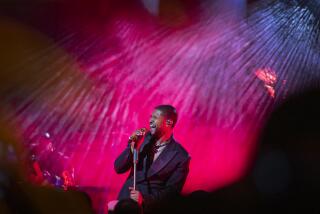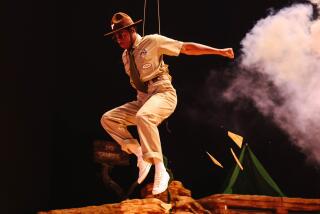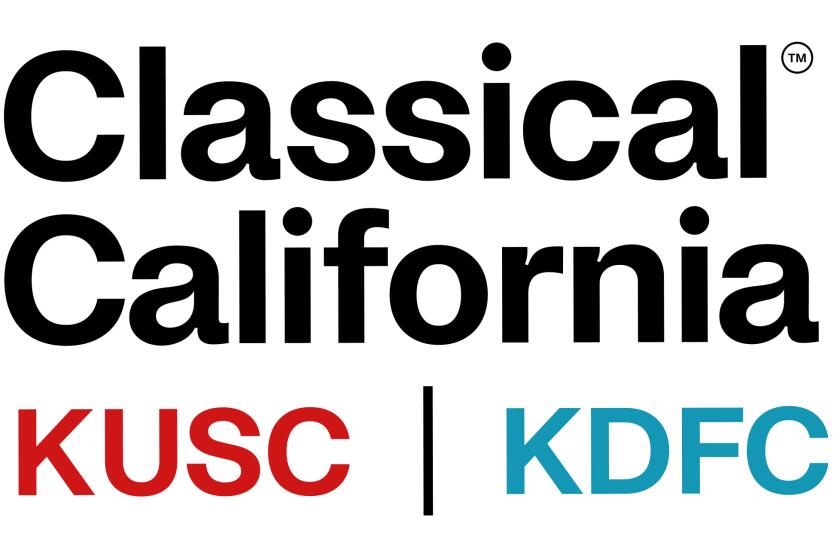Frampton: Alive and Kicking : At Coach House, He Shows All His Performing Faculties Are Intact
- Share via
SAN JUAN CAPISTRANO — In 1971, when the Who was at its peak, Pete Townshend came up with a lyric that went, “I can’t pretend there’s any meaning hidden in the words I’m saying.”
Townshend, who wanted to be a voice for his generation, was being disingenuous when he wrote that song, “I’m in Tune.” But Peter Frampton, another British guitar ace who at that time was just preparing to launch his own solo recording career, could have sung the line with utmost sincerity.
The shocking thing was that five years later Frampton put out an album that outsold anything the Who ever released in its artistically brilliant, Hall of Fame career. Without registering any particular meaning, the catchy, comfortably likable tunes on “Frampton Comes Alive!” racked up a reported 15 million in worldwide sales, at the time the biggest sales success in rock history.
Of course, substance has its advantages. When the Who staged a 1989 comeback tour, with no new album to showcase, it played stadiums because ticket buyers realized they would be seeing the return of greatness. Frampton’s comeback after a six-year layoff from touring is taking place in less expansive surroundings.
Like the Who in its comeback, Frampton had no new record to play Tuesday as he began a sold-out, two-night stand at the Coach House. But unlike the Who, whose tour was a sadly diminished last goodby, Frampton at least remains all that he was back in his heyday: an unassuming fellow who exudes niceness, sings in a pleasant but far from arresting voice, and plays his guitar just like ringing a bell.
Anyone looking for meaning in the things Frampton was saying had to be alert right at the start--or even before the start.
As the lights dimmed, a familiar, gritty voice came over the PA, singing a new refrain. It was the voice of Steve Marriott, Frampton’s old partner in Humble Pie, the band Frampton left in 1971 to go solo. The song, a heavy-blues pounder, was one of several never-released pieces that Frampton and Marriott recorded together in a 1990-91 reunion that was cut short by Marriott’s death in a house fire. Its refrain, “The Bigger They Come, the Harder They Fall,” could be taken as an eight-word synopsis of Frampton’s post-”Comes Alive” career. No album had ever been bigger before Frampton came along, and nobody who got that big ever fell quite so fast as Frampton, whose career was in free fall two albums later.
When Frampton and his three-man band came on after the recording, they jumped into “Back to the Start,” a good, thwacking rocker from Frampton’s most recent album, the poorly selling 1989 release, “When All the Pieces Fit.”
Its lyrics spoke of wrong paths taken--”Well, I spent a little time drivin’ down the wrong road now”--but it ended with an optimistic outlook for recovery. That was it as far as self-reflection went, because for the rest of the night Frampton concentrated on chirpy love songs, energetic but lyrically unambitious rockers, and, in small doses, friendly but unrevealing stage talk.
Frampton quickly showed that all his old performing faculties were intact, including his ability to get an audience to cheer just by waving a fist in the air. His guitar technique remains clean and fluid, clearly articulated and lyrical, yet with plenty of bite. In case anyone had any doubts, Frampton launched the second number, the oldie “It’s a Plain Shame,” with an extremely flash solo guitar intro. As the show went on, he would reel off any number of exceedingly tasteful and tuneful guitar trips with effortless aplomb, and without any bows to contemporary grunge and metal styles.
For the most part, Frampton looked to re-establish himself during the nearly two-hour performance with cheery favorites from the 1972-76 period chronicled on “Comes Alive.” The only song with much potential for emotional depth was “Lines on My Face,” a 1973-vintage ballad about the onset of a divorce. Frampton’s choppy, declamatory vocal phrasing wasn’t exactly what was needed to probe deeply and conjure images of an intensely emotional, one-on-one confrontation.
Frampton’s material ranged from breezy (“Show Me the Way,” “The Lodger,” and several tunes covered during a solo-acoustic sequence) to incredibly saccharine (a back-to-back positioning of “I’m in You” and “Baby, I Love Your Way”--the latter at least featuring a gorgeous, jazz-leaning guitar intro). The full house wasn’t all that keen on singing along, although Frampton provided numerous openings for his fans to join in. That didn’t mean, however, that they weren’t keen on Frampton. They cheered his songs loudly, and interrupted the show for standing ovations after “Show Me the Way” and “Baby, I Love Your Way,” two of the Top 40 hits from “Comes Alive.”
Just as he did on the album, Frampton overextended its third chart hit, “Do You Feel Like We Do?” to more than 15 minutes. What would have been a decent six-minute rocker (as it is in its original studio version) was larded with call-and-response audience participation parts, a lengthy guitar solo using the voice box, a distortion method that makes a guitar sound half burping, half mechanical, like a robot with the colic. Frampton had already used that particular trick on “Show Me the Way”--and once was more than enough.
Frampton had expert backing from Bob Mayo, who doubled on keyboards and guitar, soloing nicely on both, bassist John Regan, and drummer Jamie Oldaker, who anchored the band with a strong, syncopated combination of muscle and dexterity. Along with Frampton’s own imposing fretwork, they helped bring musicianly substance to lightweight fare.
Frampton and band gave the fans an upbeat encore send-off that opened with two of his most ebullient rockers, “Somethin’s Happening” and “Shine On.”
Frampton then stopped for a moment to wax nostalgic about Humble Pie jamming at a sound check before its first performance at Madison Square Garden. Emotion rose in his voice for a moment as he remembered Marriott, to whom he dedicated a closing rendition of the Humble Pie staple, “I Don’t Need No Doctor.”
It proved why Humble Pie was much more Marriott’s band than Frampton’s: Frampton’s reedy voice doesn’t begin to cut it on bluesy material. But it also proved why Marriott must have valued Frampton’s presence in the band before he left: once the vocal part was finished, Frampton and his musicians gathered at close quarters in the middle of the stage and finished off the show with some powerhouse jamming.
Whether Frampton’s career will come alive again depends mainly on whether he can write new melodies that have the jaunty appeal of the faves he ran through during his show. Clearly, he has come through his long down period with all the other necessities in good shape.
Hailing from Saskatoon, Saskatchewan, the opening Northern Pikes came across as a bar band trying to rise above its heartland roots. The members’ somewhat forced verve in relating to the crowd betrayed those bar band instincts. But the band sidetracked itself by often downshifting into moody instrumental passages.
When it did try to play it straight on songs steeped in Rolling Stones and barrelhouse-piano boogie influences, the Northern Pikes lacked the requisite wallop. The band came off best on “Love and a Muscle” and “Dancing in a Dance Club,” two heavy-funk numbers that featured manic outbursts from Merl Bryck, the best of its three lead singers.
More to Read
The biggest entertainment stories
Get our big stories about Hollywood, film, television, music, arts, culture and more right in your inbox as soon as they publish.
You may occasionally receive promotional content from the Los Angeles Times.











